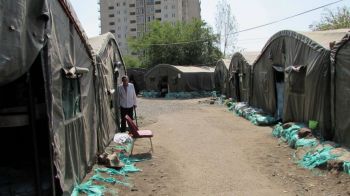Giorgi Janelidze, humanrightshouse.org
Homeless people have been sheltering tents set up in Moscow Avenue in Tbilisi since December 2013. The Government of Georgia announced the initiative after nongovernmental organizations raised the issue very urgently. In extremely cold winter of 2013-2014, 12 tents for 80 persons were set up in Moscow Avenue. Since then, people permanently go to the tents at night and sleep there if they have nowhere else to go.
Although the initiative about tents aimed to shelter homeless people only throughout winter, the tents have been hosting beneficiaries for ninth month already. Monitoring by Human Rights House Tbilisi showed that number of satisfied and dissatisfied beneficiaries is almost equal.
Heat, smell, problems in water supply, noise, aggressive tone of drunken men – it is everyday problems of homeless people that make their life even worse. As for positive aspects of the initiative, beneficiaries have 24-hour-watch of patrol police and medical unit.
Beneficiaries have many problems and completely different from each other. In August, a rat bit Eter Akhverdashvili in the tent; she claims she could not receive timely medical assistance and still takes special injections. Vasil Akopyan, who had a stroke, requests single financial assistance from the state to start legal procedures for the return of his property in Gori. Tamar Iakobidze sold her house to pay medical treatment for her child and has lived in the street since then. Marina Azmanyan admits huge difference between living in the street and in the shelter and is satisfied for the service/assistance provided in the Tent Town. Shorena Tsomaia introduced herself as victim of domestic violence. She thanks to the government and particularly to the Minister of Healthcare Davit Sergeenko for the imitative but complains about sanitary conditions. Old man Pavle Licheli appeared in the shelter after a stroke. Like others, he complains about small space and lack of hygiene conditions (homeless people sleep of military-type double beds in tents).
According to the Ministry of Healthcare, about 170-190 homeless people sleep in the Tent Town. The criteria to accept beneficiaries are very simple: a patrol police officer detects and takes homeless person to tents, or beneficiary personally goes there and asks for shelter. Nino Talakhadze of the Ministry of Healthcare told correspondent of the HRHT Nino Akhobadze that the shelter is temporary accommodation like it was initially planned. In parallel to that, a territory was allocated in Lilo Settlement – in the outskirts of Tbilisi, where Tbilisi City Hall intends to construct new shelter. Ministry representative said, since tents are temporary shelters, necessary sanitary norms are ensured there. As for the construction, which will be built by the Tbilisi City Hall, it will have status of permanent shelter for homeless people and hygiene standards will be absolutely followed there.
Lawyer Sopio Aleksidze, who represents Article 42 of the Constitution in the project implemented by the Human Rights House Tbilisi, stated after the field visit that “first problem of beneficiaries is absence of social assistance that means majority of them does not have any income; second is lack of ID documents that is naturally connected with financial resources; in addition to that they have problems of anti-sanitary and improper living conditions. First of all the state must provide them with adequate living space, then with subsistence minimum and allowances.”
Human Rights House Tbilisi carried out monitoring of the shelter of homeless people in the frame of the project Human Rights in the Regions. The project is implemented with financial support of the Embassy of the Kingdom of the Netherlands in Georgia. HRHT member organizations participate in the project, which provide socially vulnerable groups of people with free legal and psychological consultations, conduct monitoring. Project video crew produces short documentary films and presents them to the society via social or other media sources.
News
December 13, 2023
Ethnic minorities outside the peace dialogue
November 6, 2023
‘Peace’ agenda of political parties
Popular
Articles
February 13, 2024




